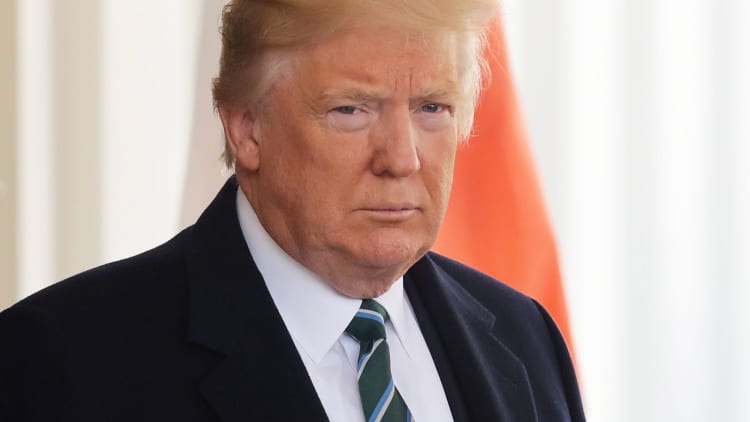
President Donald Trump on Monday denied he colluded with Russia in the 2016 U.S. election, lashing out at Democrats ahead of a public hearing on the investigation into Moscow's alleged influence on the contest.
In a series of tweets, the president cited former Director of National Intelligence James Clapper's statement this month that no evidence of collusion between Trump and Russia existed. Trump alleged that Democrats "made up and pushed the Russia story" to deflect from the presidential election loss and argued that finding people who leaked information about his associates is "the real story."
The denials come ahead of a rare public House Intelligence Committee hearing on the probe into Russian meddling in the election, which will feature testimony from FBI Director James Comey and National Security Agency Director Michael Rogers. The U.S. intelligence community has accused Moscow of trying to influence the election, saying it initially wanted to derail then-candidate Hillary Clinton and then developed a preference for Trump.
The Trump administration has denied that the president's campaign cooperated with Russia before the election. Comey's and Rogers' testimony may cast more light on any ties.
Trump blamed Democrats on Monday for stirring concerns about Russia, but top Republican lawmakers John McCain, Lindsey Graham and Marco Rubio, among others, have publicly said they want to find out more about Russia's role in the election.
The top Republican and Democrat on the House Intelligence Committee differed in public statements on the evidence of collusion Sunday. Chairman Rep. Devin Nunes, R-Calif., told Fox News that he saw no information to show collusion.
However, Rep. Adam Schiff, D-Calif., told NBC's "Meet the Press" that he saw "circumstantial evidence of collusion" and direct evidence of "deception."
Accusations of Russia connections have dogged the Trump administration since he took office in January. His first national security advisor, Michael Flynn, resigned last month following revelations that he misled White House officials about whether he discussed sanctions on Russia in conversations with Sergey Kislyak, the Russian ambassador to the U.S., before Trump took office. The Obama administration brought those sanctions in response to the alleged meddling.
Attorney General Jeff Sessions then recused himself from any investigations into the Trump campaign following accusations that he misled senators about his contact with Kislyak during his January confirmation hearing. Sessions, a former senator and Trump campaign advisor, admitted that he met with the ambassador during the campaign but said he did so in his capacity as a lawmaker.


